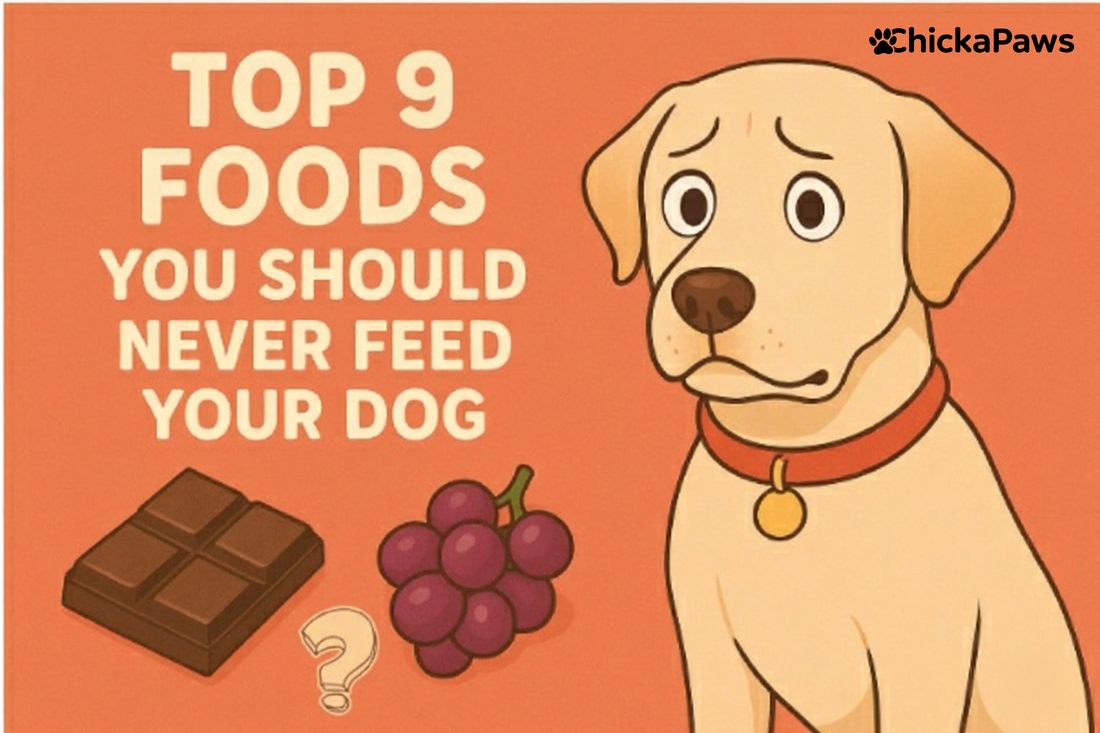
⚠️10 Human Foods That Are Dangerous for Dogs — What Every Pet Parent Should Know
Share
It happens every day — you’re eating dinner, and your dog looks up with those big, pleading eyes. You smile, thinking “Just one bite won’t hurt.”
But what if that small act of love could cause real harm?
Many foods that are perfectly safe for humans can be toxic — even deadly — to dogs.
Knowing what to avoid is one of the simplest, most powerful ways to protect your furry best friend.
Let’s explore the top 10 human foods that could put your dog at risk — and what safer, healthier alternatives you can offer instead.
1. Chocolate 🍫

Sweet for us, deadly for them.
Chocolate contains theobromine and caffeine, which a dog’s body can’t process effectively. Even small amounts can trigger vomiting, tremors, heart irregularities, or worse.
Vet insight: Dark chocolate and baking cocoa are the most dangerous — they have the highest toxin levels.
Safe alternative: Try carob-based dog treats, which look and taste similar without the risk.
2. Grapes and Raisins 🍇
 This one shocks many owners. Grapes — fresh or dried — can cause sudden kidney failure in dogs.
This one shocks many owners. Grapes — fresh or dried — can cause sudden kidney failure in dogs.
No one knows exactly why, but even a few pieces can be fatal.
Safe alternative: Blueberries — full of antioxidants and 100% safe for dogs.
3. Onions and Garlic 🧅🧄

Both contain thiosulfate, which destroys red blood cells and causes anemia. Whether raw, cooked, or powdered, they’re dangerous in any form.
Watch out for: baby food, soups, and sauces — they often contain onion or garlic powder.
4. Avocado 🥑
 Avocado contains persin, a toxin that may cause vomiting, diarrhea, and upset stomach.
Avocado contains persin, a toxin that may cause vomiting, diarrhea, and upset stomach.
While small amounts of avocado flesh might not kill a dog, the pit poses a choking hazard and can block the intestines.
5. Xylitol (in sugar-free gum, candy, or peanut butter)

Xylitol is an artificial sweetener that causes a dog’s blood sugar to plummet within minutes. It can also lead to liver failure.
Safe alternative: Always read labels before sharing peanut butter. Choose xylitol-free, all-natural options.
6. Alcohol 🍷
 A sip may seem harmless, but alcohol affects dogs differently — much faster and more severely.
A sip may seem harmless, but alcohol affects dogs differently — much faster and more severely.
Even small doses can lead to seizures, coma, or respiratory failure.
Dogs don’t metabolize alcohol like humans. One teaspoon per pound of body weight can be fatal.
7. Cooked Bones 🍖
 Cooked bones splinter easily, creating sharp edges that can puncture the digestive tract or cause choking.
Cooked bones splinter easily, creating sharp edges that can puncture the digestive tract or cause choking.
Raw bones are safer but should only be given under supervision.
Safe alternative: Durable rubber chew toys from trusted brands like ChickaPaws, designed for safe chewing satisfaction.
8. Macadamia Nuts 🌰
 These nuts contain an unknown toxin that can cause weakness, vomiting, and tremors.
These nuts contain an unknown toxin that can cause weakness, vomiting, and tremors.
Symptoms may last up to 48 hours and can appear within hours of ingestion.
9. Caffeine ☕
 Coffee, tea, and energy drinks stimulate a dog’s nervous system, leading to hyperactivity, rapid heartbeat, or seizures.
Coffee, tea, and energy drinks stimulate a dog’s nervous system, leading to hyperactivity, rapid heartbeat, or seizures.
Even caffeine pills or leftover coffee grounds can be toxic.
10. Dairy Products 🥛
 Most adult dogs are lactose intolerant. Their digestive systems lack the enzyme needed to break down lactose, which leads to bloating, gas, and diarrhea.
Most adult dogs are lactose intolerant. Their digestive systems lack the enzyme needed to break down lactose, which leads to bloating, gas, and diarrhea.
Safe alternative: Lactose-free dog ice cream or frozen banana treats for a cool reward.
🐶 The Hidden Danger: Love and Guilt

We often give table scraps because we feel love — or guilt. When dogs beg, it’s easy to give in.
But the truth is, real love means saying “no.”
Protecting your dog’s health is far more powerful than a quick moment of joy.
“The greatest act of love a dog owner can show is discipline wrapped in compassion.” — PetSafe Journal, 2024
🌿 Tips to Keep Your Dog Safe

-
Store toxic foods out of reach — remember, some dogs can open cabinets.
-
Share this list with family, kids, and pet sitters.
-
Keep the ASPCA Animal Poison Control Center number saved: (888) 426-4435.
👉 Pro Tip: Print a “Toxic Foods for Dogs” chart and place it on your fridge — one small reminder could save a life.
